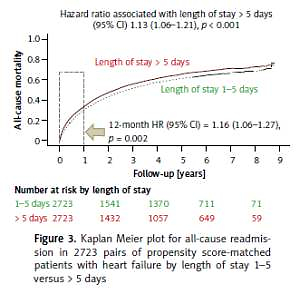Current issue
Archive
Manuscripts accepted
About the Journal
Editorial office
Editorial board
Section Editors
Abstracting and indexing
Subscription
Contact
Ethical standards and procedures
Most read articles
Instructions for authors
Article Processing Charge (APC)
Regulations of paying article processing charge (APC)
CARDIOLOGY / CLINICAL RESEARCH
Length of stay and readmission in older adults hospitalized for heart failure
1
Veterans Affairs Medical Center, Washington, DC, USA
2
George Washington University, Washington, DC, USA
3
Georgetown University, Washington, DC, USA
4
MedStar Washington Hospital Center, Washington, DC, USA
5
University of Alabama at Birmingham, Birmingham, AL, USA
6
University of California, Los Angeles, CA, USA
7
Weschester Medical Center, Valhalla, NY, USA
8
New York Medical College, Valhalla, NY, USA
Submission date: 2019-02-20
Final revision date: 2019-05-13
Acceptance date: 2019-06-05
Online publication date: 2020-01-08
Publication date: 2021-07-16
Arch Med Sci 2021;17(4):891-899
KEYWORDS
TOPICS
ABSTRACT
Introduction:
Hospital length of stay (LoS) and hospital readmissions are metrics of healthcare performance. We examined the association between these two metrics in older patients hospitalized with decompensated heart failure (HF).
Material and methods:
Eight thousand and forty-nine patients hospitalized for HF in 106 U.S. hospitals had a median LoS of 5 days; among them, 3777 had a LoS > 5 days. Using propensity scores for LoS > 5 days, we assembled 2723 pairs of patients with LoS 1–5 vs. > 5 days. The matched cohort of 5446 patients was balanced on 40 baseline characteristics. We repeated the above process in 7045 patients after excluding those with LoS > 10 days, thus assembling a second matched cohort of 2399 pairs of patients with LoS 1–5 vs. 6–10 days. Hazard ratios (HR) and 95% confidence intervals (CI) for outcomes associated with longer LoS were estimated in matched cohorts.
Results:
In the primary matched cohort (n = 5446), LoS > 5 days was associated with a higher risk of all-cause readmission at 30 days (HR = 1.16; 95% CI: 1.04–1.31; p = 0.010), but not during longer follow-up. A longer LoS was also associated with a higher risk of mortality during 8.8 years of follow-up (HR = 1.13; 95% CI: 1.06–1.21; p < 0.001). LoS had no association with HF readmission. Similar associations were observed among the matched sensitivity cohort (n = 4798) that excluded patients with LoS > 10 days.
Conclusions:
In propensity score-matched balanced cohorts of patients with HF, a longer LoS was independently associated with poor outcomes, which persisted when LoS > 10 days were excluded.
Hospital length of stay (LoS) and hospital readmissions are metrics of healthcare performance. We examined the association between these two metrics in older patients hospitalized with decompensated heart failure (HF).
Material and methods:
Eight thousand and forty-nine patients hospitalized for HF in 106 U.S. hospitals had a median LoS of 5 days; among them, 3777 had a LoS > 5 days. Using propensity scores for LoS > 5 days, we assembled 2723 pairs of patients with LoS 1–5 vs. > 5 days. The matched cohort of 5446 patients was balanced on 40 baseline characteristics. We repeated the above process in 7045 patients after excluding those with LoS > 10 days, thus assembling a second matched cohort of 2399 pairs of patients with LoS 1–5 vs. 6–10 days. Hazard ratios (HR) and 95% confidence intervals (CI) for outcomes associated with longer LoS were estimated in matched cohorts.
Results:
In the primary matched cohort (n = 5446), LoS > 5 days was associated with a higher risk of all-cause readmission at 30 days (HR = 1.16; 95% CI: 1.04–1.31; p = 0.010), but not during longer follow-up. A longer LoS was also associated with a higher risk of mortality during 8.8 years of follow-up (HR = 1.13; 95% CI: 1.06–1.21; p < 0.001). LoS had no association with HF readmission. Similar associations were observed among the matched sensitivity cohort (n = 4798) that excluded patients with LoS > 10 days.
Conclusions:
In propensity score-matched balanced cohorts of patients with HF, a longer LoS was independently associated with poor outcomes, which persisted when LoS > 10 days were excluded.
Share
RELATED ARTICLE
We process personal data collected when visiting the website. The function of obtaining information about users and their behavior is carried out by voluntarily entered information in forms and saving cookies in end devices. Data, including cookies, are used to provide services, improve the user experience and to analyze the traffic in accordance with the Privacy policy. Data are also collected and processed by Google Analytics tool (more).
You can change cookies settings in your browser. Restricted use of cookies in the browser configuration may affect some functionalities of the website.
You can change cookies settings in your browser. Restricted use of cookies in the browser configuration may affect some functionalities of the website.



